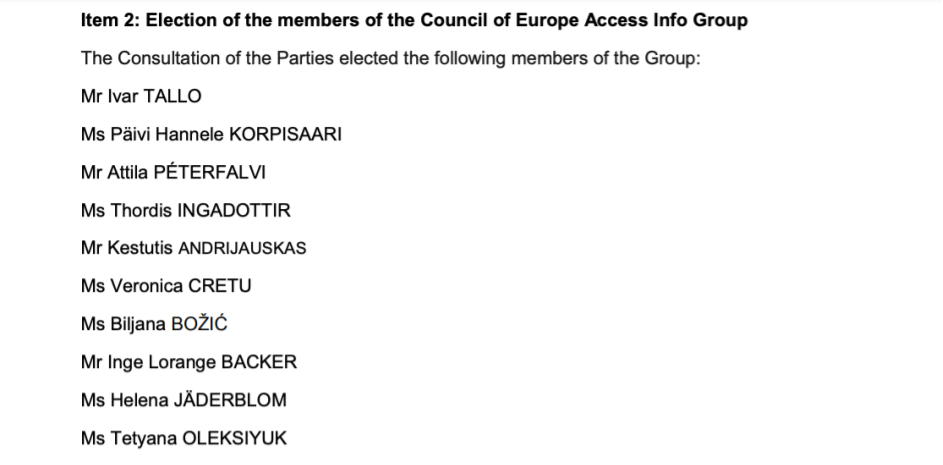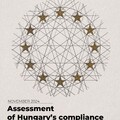Although the Council of Europe Convention on Access to Official Documents has been in force since December 2020, the Hungarian government has not carried out any harmonization of laws, except to secretly put the president of the Hungarian National Authority for Data Protection and Freedom of Information on the international group of experts entrusted with the monitoring of the implementation of the Convention.

In 2009, the Council of Europe adopted the Tromsø Convention, the first international treaty to explicitly recognise the right of citizens to access documents held by public authorities.
Hungary was among the first states in the Council to sign and ratify the Convention in 2009.
Despite its adoption in 2009, the convention would not enter into force until 1 December 2020 as the member states had agreed that the rules can only enter into force after ten states have ratified the Convention. This happened only in 2020, after Ukraine's ratification.
In order to monitor the implementation of the Convention, the Council of Europe has set up an international group of experts, the so-called Access Info Group. The members of the Access Info Group cannot take instructions from national governments and must be independent and impartial. The competences of the Access Info Group include, among other things, the monitoring of the effective implementation of the Convention and drafting proposals for amendments to the Convention.
Under the Convention, the members of the Access Info Group are elected for a four-year term by the ratifying states based on a list of candidates, to which each state may propose two persons of the highest integrity recognised for their competence in the field of freedom of information.
The selection procedure is set out in a Committee of Ministers’ resolution. The rules state that countries must select their candidates to the Access Info Group through a transparent and open process. To ensure competition, the selection should be based on a public call for candidatures. The nomination process should not be monopolized by the government, it should involve relevant non-governmental bodies.
The Hungarian Winner is…
As we have already mentioned, the members of the group were elected in March this year by the states. Despite the nomination rules set by the Committee of Ministers’ resolution, there can be found no trace of an open call for nominations on the Hungarian government's websites, and even the entry into force of the Convention did not find an echo.
The Council of Europe's calendar shows that each state had to submit a list of candidates for the Access Info Group to the Council by 15 July 2021.
Therefore, K-Monitor submitted a FOI request to the Hungarian Ministry of Justice responsible for implementing the Convention, right after the deadline. In the request, we asked for information on the selection process, in particular the schedule and steps of the selection procedure, the deadlines and the procedure for submitting and evaluating applications.
The ministry's response in August did not clarify the situation. Firstly, the ministry declared - without any justification - that it did not consider our request aiming at getting information on the Convention to be a request under Freedom of Information Law. In addition, their two-page reply largely consisted of copying the text of the Convention and the resolution. However, the copy-pasting was limited, because the ministry omitted the parts of the resolution requiring publicity and the involvement of NGOs. They concluded their letter with the following:
‘In the light of the Convention and the Resolution, Hungary has exercised the utmost caution in the selection of candidates, nominating those with the greatest expertise in the field of freedom of information. Nominees are selected by taking into account other criteria in the Resolution, including, for example, requirements of gender balance. It should also be noted that the nomination procedure is without precedent, given the recent entry into force of the Convention, and that both the Resolution and the practice based on it may be supplemented - or clarified - in the future, in the light of the experience of the first nomination process.’
K-Monitor did not accept their response and asked the ministry to indicate on which public platform the possibility to apply or be nominated for the Group had been published. We also asked the ministry to name the public bodies and non-governmental organizations involved in the selection procedure. Last but not least, we asked about the persons selected by the government and their bio.
The ministry's response in September was not more helpful than the previous one. The ministry, this time considering us as FOI requesters, informed us that the Council of Europe selection rules were not legally binding, but once again, it assured us that the most qualified persons had been selected. The nominees’ identities were therefore refused by the ministry to be public - without justification.
Eventually, as an NGO focusing on Freedom of Information in Hungary, we learned about the nominee of the Hungarian government not as a result of our FOI request but by following the Council of Europe’s website. According to a minute published by the Council, it can be seen that on 31 March Mr Attila Péterfalvi, the head of the National Authority for Data Protection and Freedom of Information (NAIH), was the Hungarian elected by the state parties to participate in the work of the Access Info Group monitoring, among others, legislation by the Hungarian government.

The Resolution states that members in the Access Info Group may not accept instructions from any government or organization when performing their duties. While the mere fact that a member works in the public sector does not call into question that person's independence and impartiality, the Resolution does not allow a member to hold ‘decision‑making positions as regards defining and/or implementing policies in the field of access to official documents in government or in any other organization or entity, which may give rise to a conflict of interest with the responsibilities inherent to membership of the Group of Specialists.’
Mr Attila Péterfalvi, as head of the NAIH, can formally be considered independent from the government thus fulfilling the first condition of the Resolution. His activities however, as an expert monitoring the Hungarian state of access to information may be considered incompatible with his position as head of NAIH. Indeed, it is of his exclusive power as President of the authority, to conduct a review procedure in cases where the government classifies information as confidential.
Reporting in Delay
The Convention also requires each state to submit a comprehensive report within one year of its entry into force, showing how it has brought its domestic law into line with the Convention. As the Convention entered into force on 1 December 2020, the one-year deadline for Hungary expired at the end of last year.
The March minutes also show that the Hungarian government has failed to meet this obligation. It had to recourse its failure to report ‘as soon as possible but no later than 30 April 2022.’
Although the Convention stipulates that the harmonization of laws should have been performed by December 2020 at the latest, the Ministry of Justice, which is responsible for implementation, has not drafted a single bill to comply with the Convention in the almost one and a half years since it entered into force.
What would the Convention bring to Hungary's FOI framework?
The Convention brings one significant change to the rules on freedom of information in Hungary. Under the current rules, if a body does not have the data requested, it must reject the request. In such cases, the data requester can turn to the FOI Authority, NAIH or to court, and a time-consuming - and in the case of litigation, very costly - procedure may reveal which body is competent for the data.
Under the Convention, in such cases, the body receiving the request has two options other than a sole rejection. Whenever possible, it shall refer the request to the competent public authority or inform the requester of the competent body to which they can address their request.
The new rules introduced by the Convention are therefore changes that strengthen the position of applicants by forcing public authorities to engage in a kind of facilitative dialogue with citizens.
A Recommendation from the Specialist
In addition to the secrecy of the Hungarian government, Hungary's FOI Authority is not trying to communicate about the Convention either. Overall, we found little evidence in the Authority's activities that the Convention is already in force. In February 2022, NAIH president Mr Attila Péterfalvi issued a recommendation to Hungarian public authorities. Although the recommendation does not address the government's failure to act, it does mention the Convention as a relevant law.
The recommendation essentially interprets the prevailing provisions of the Hungarian Freedom of Information Act in line with the Convention, namely, that public authorities must refer the applicant to the competent public authority. However, a proactive referral of the request is not mentioned in the recommendation.
Although the domestic law states that the head of the NAIH may raise the flag and propose the government amendments to the legislation, there is no sign so far that Mr Attila Péterfalvi, member of the Access Info Group, has turned to the Hungarian government to remedy the one and a half year long failure to act and to end the violation of the Convention.
It All Hinges on the Government?
As the Convention has been in force since 2020, its citizen friendly provisions should be enforceable by now. However, as they have not been transposed into the Hungarian Freedom of Information Act, courts could interpret a reference to the Convention differently.
This already happened in a case when the Kúria, which is the highest court of Hungary, also emphasized the need for transposition in a 2016 judgment delivered way before the entry into force: 'by acceding to the Convention, the States Parties undertake an obligation to legislate, and the provisions of the Convention cannot serve as a direct basis for the litigation in an individual case to be decided under the national law of the States Parties' (Pfv.IV.21.438/2016/6.)
K-Monitor recently filed a lawsuit against a ministry, which has neither responded to our request nor referred it to the relevant authority. In this case, the court must decide, among other things, on the applicability of the Convention. The defendant's position is that the Convention is applicable, however, since the Hungarian legislation has not imposed sanctions for breaching the Convention, practically, there are no consequences for a violation.
K-Monitor is an independent Budapest-based anti-corruption watchdog. Support us!
Címkék: english
Szólj hozzá!
A bejegyzés trackback címe:
Kommentek:
A hozzászólások a vonatkozó jogszabályok értelmében felhasználói tartalomnak minősülnek, értük a szolgáltatás technikai üzemeltetője semmilyen felelősséget nem vállal, azokat nem ellenőrzi. Kifogás esetén forduljon a blog szerkesztőjéhez. Részletek a Felhasználási feltételekben és az adatvédelmi tájékoztatóban.





